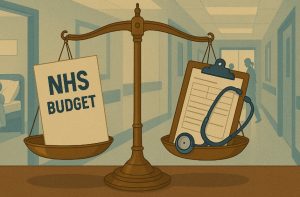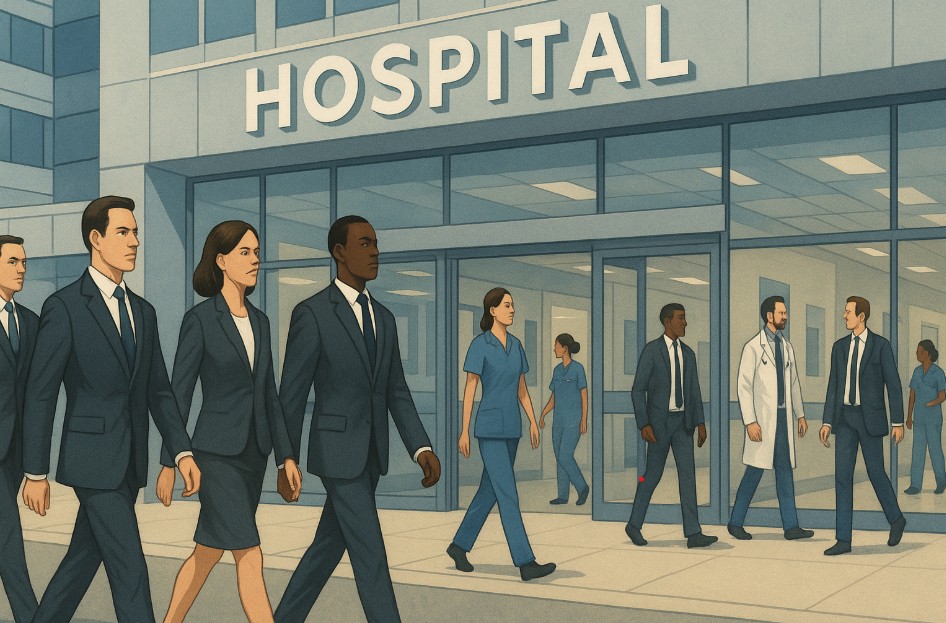NHS Managers Salary – What Do UK Healthcare Leaders Earn?
How Is the NHS Management Pay Structure Organised?
In the UK’s healthcare system, the role of NHS managers is critical to the operation and performance of hospitals and trusts. But with rising public scrutiny, a key question remains: how are NHS managers paid, and is their remuneration fair and proportionate to their responsibilities?
NHS management pay falls under the Agenda for Change (AfC) framework, the national pay system for all NHS staff except doctors, dentists, and very senior managers. This system categorises jobs into bands from 1 to 9, each with defined pay ranges and progression steps.
Managers generally start at Band 7, covering lower management or department supervisory roles, and rise up to Band 9, encompassing directors and senior executives.
While AfC ensures pay consistency, some of the highest-paid NHS figures operate outside this framework, especially chief executives and executive directors.
Over time, this structured model has been questioned, particularly as salaries at senior levels have escalated, even within poorly performing trusts.
What Are the Current Salary Bands for NHS Managers?
The table below outlines the standard 2024 salary bands for NHS managers as per the Agenda for Change pay scale.
| Band | Job Role Examples | Salary Range (2024) |
| Band 7 | Department Manager, Team Leader | £43,742 – £50,056 |
| Band 8a | Service Manager, HR Manager | £50,952 – £57,349 |
| Band 8b | Senior Service Manager | £58,972 – £68,525 |
| Band 8c | Department Head | £70,417 – £81,138 |
| Band 8d | Associate Director | £83,571 – £96,376 |
| Band 9 | Director / Executive Role | £99,891 – £114,949 |
However, these figures only represent base salaries. Actual total remuneration can be significantly higher due to performance-related pay, pension contributions, bonuses, relocation costs, and other benefits.
It’s in these extras that public concern is growing, especially when performance at many NHS trusts fails to meet basic national standards.
Who Earns the Most on the NHS Rich List?

A new report by the TaxPayers’ Alliance (TPA) exposed the upper limits of NHS managerial pay. The 2023–24 NHS Rich List revealed some eye-watering figures:
- 1,694 senior managers received over £100,000 in total remuneration
- 512 earned more than the Prime Minister’s annual salary of £172,153
- 17 were paid over £300,000
- Ann James, CEO of University Hospitals Plymouth, received the highest recorded remuneration of £397,500
These numbers include all benefits and bonuses. The list covers 224 NHS trusts, with total remuneration encompassing salary, pension, bonuses, expenses, and settlement agreements.
Critics say these salaries don’t correlate with performance. For instance, University Hospitals Plymouth, where Ann James serves as CEO, ranked 95th out of 136 trusts for A&E waiting times.
Are NHS Executive Salaries Justified Amid Performance Issues?
This question has dominated the public debate following the Rich List’s publication.
Several NHS managers and executives are receiving high six-figure packages despite leading trusts that are underperforming on key measures like A&E waiting times and referral-to-treatment (RTT) metrics.
For example:
| Trust | Executive Pay | A&E Ranking | RTT Ranking |
| East Cheshire NHS Trust | £367,500 (Dir. HR) | 136/136 | Not disclosed |
| University Hospitals Birmingham | £427,500 (CEO) | 119/136 | 128/149 |
| University Hospitals Sussex | £252,500 (CEO) | 105/136 | 143/149 |
This perceived disconnect between reward and results is what prompted experts like Dr Andrew Vallance-Owen to brand the situation “a nonsense”, questioning why such large sums are being allocated when frontline care is faltering.
Dr Vallance-Owen also noted the generational disparity. His niece, a doctor in training earning £55,000, was out-earned by her friend on the NHS Management Training Scheme who received £75,000 despite the former taking on high clinical responsibility.
How Do NHS Manager Salaries Compare to Frontline Medical Staff?
When compared side-by-side with clinical professionals, especially doctors and nurses, NHS managers often receive higher pay with less direct patient responsibility. A senior registrar or consultant doctor might earn £90,000–£120,000, working irregular hours in stressful environments.
Meanwhile, a Band 8c–9 manager can earn upwards of £80,000–£110,000, and some executive leaders receive more than double that.
The contrast becomes particularly stark when:
- Hospital performance is below target
- Funding is strained
- Nurses are striking or leaving due to low pay
It raises fundamental questions about prioritisation in NHS budgeting, and whether management growth has come at the cost of clinical support.
Are NHS Managers Paid More Than the Prime Minister?

Yes over 500 NHS senior managers now earn more than the Prime Minister. This is one of the most contentious aspects of the debate. For a public service organisation funded by taxpayers, perception matters.
With headlines highlighting failing hospitals and record-long waiting lists, the fact that 17 NHS leaders earn over £300,000 has been met with outrage.
The optics, as critics argue, are poor. It gives the impression of administrative bloat in a system meant to serve patients first.
What Are the Benefits and Perks NHS Managers Receive?
While base pay forms the foundation, NHS managers also enjoy a comprehensive set of perks:
- NHS Pension Scheme: Considered one of the most generous in the public sector
- Annual leave of up to 33 days, plus bank holidays
- Bonus payments and settlement packages
- High-cost area supplements in London and surrounding regions
- Flexible working opportunities, including hybrid and remote options
- Expense allowances for travel and accommodation
These additional benefits contribute to the growing perception that management roles are financially more attractive than clinical ones, especially when job risk and responsibility are considered.
Should There Be Salary Caps for NHS Managers?

This debate is gaining traction. Public figures, watchdogs, and news outlets are increasingly calling for a cap on managerial pay in the NHS.
GB News host Martin Daubney posed a pointed question:
“Should we forget about private-sector pay for public-sector workers like at the BBC? Maybe it’s time for salary caps or a complete audit to trim middle management bloat.”
The notion is not without precedent. Other countries have introduced public sector salary ceilings, tying maximum pay to political leaders or top-level civil servants.
Still, proponents of high executive pay argue that to attract top-tier talent, the NHS must compete with the private sector.
Are High Salaries Linked to Better Trust Performance?
The data suggests otherwise. Many of the best-performing trusts have executives on modest salaries, while some of the worst are home to the highest earners.
Example:
- Queen Victoria Hospital, ranked top for A&E wait times, had no manager earning over £100,000
- Cambridgeshire and Peterborough, worst RTT performer, paid eight senior managers six-figure salaries, including a Chief Medical Director earning £387,500
This contradiction reinforces the demand for reform one that links compensation with actual patient outcomes, not just management titles.
What Are the Regional Differences in NHS Managerial Pay?
Though standardised by national pay bands, actual earnings differ based on region due to:
- London weighting supplements
- Regional talent shortages
- Discretionary bonuses
In 2023–24, the highest regional salaries by country were:
| Region | Highest Salary | Role |
| England | £397,500 | CEO, University Hospitals Plymouth |
| Scotland | £242,500 | Portfolio Lead, NHS Grampian |
| Wales | £232,500 | CEO, Cardiff and Vale University Health Board |
| Northern Ireland | £237,500 | CEO, NHS Belfast |
London-based managers also earn up to 20% more due to high-cost area supplements, making it one of the most lucrative NHS regions.
Is NHS Leadership Compensation Transparent and Regulated?

To some extent, yes. NHS executive pay is subject to mandatory reporting, especially for those earning over £150,000.
The NHS Pay Review Body advises on pay scales annually, while trusts are required to publish remuneration details in their annual reports.
However, critics argue that this hasn’t stopped performance bonuses for underachieving leaders or golden goodbyes after short tenures. Hence, new reforms are now in motion.
What Does the Future Hold for NHS Management Pay?
Health Secretary Wes Streeting has announced a new approach that links managerial pay to performance outcomes. This “carrot and stick” reform aims to:
- Tie bonuses to reductions in waiting lists
- End “rewards for failure”
- Reassert control over executive compensation
The reforms signal a clear direction: performance-based accountability will now shape leadership pay. It’s an attempt to restore public trust, direct funding where it’s needed most, and rebuild the NHS from the frontline up.
Is NHS Management Still a Financially Rewarding Career Path?
From a financial perspective, yes. NHS management roles offer generous salaries, benefits, and long-term job security. But they also come with intensifying scrutiny, especially for those at the top.
For aspiring professionals who aim to improve systems, optimise services, and make healthcare more efficient, NHS leadership remains a prestigious and impactful career.
But in the years ahead, success will be measured not just by salary or seniority but by how well care is delivered to the patients who depend on the system most.
FAQs About NHS Managers Salary
What is the NHS Rich List and why is it controversial?
It’s a report published by the TaxPayers’ Alliance revealing how many NHS senior managers earn over £100,000, sparking criticism for high pay at underperforming trusts.
Do NHS managers receive performance bonuses?
Yes, particularly at executive levels. Performance-related pay, pension boosts, and severance settlements are common in senior roles.
How are NHS managerial roles evaluated for pay?
Through the Agenda for Change banding system, based on job complexity, responsibility, and experience level.
Is it true some managers earn more than doctors?
Yes. In many cases, managers especially those in senior non-clinical roles earn significantly more than even experienced consultants.
Will NHS management pay be reformed soon?
Yes. New plans aim to link pay with performance, particularly in reducing waiting lists and meeting treatment targets.
Why do trust rankings matter in this pay debate?
Because many high-paid managers operate in trusts performing poorly, leading to concerns about accountability and value for money.
What’s the best route into NHS management?
Typically through a healthcare or business-related degree, experience in NHS operations, or through schemes like the NHS Graduate Management Training Programme.







